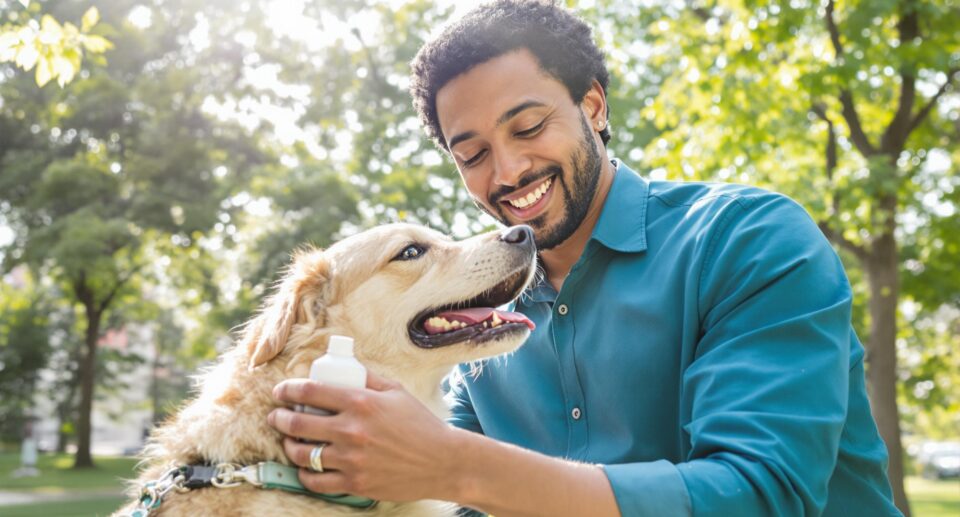What Are Allergies in Dogs?

Allergies in dogs and cats occur when the immune system overreacts to something that isn’t really a threat. For example, reacting to peanuts, air-borne pollen, or laundry detergent—none of which should cause harm. The material that causes an allergic reaction is called an antigen. Antigens are usually proteins. The term “allergen” is often used rather than the term antigen, but these two terms are slightly different. Antigen refers to any substance causing allergies, and allergen refers to ingested or air-borne substances causing allergies.
It helps to group antigens into three categories and to realize that your pet can be allergic to materials from more than one category:
- What your pet eats (foods, additives, preservatives, dyes, food storage mites);
- What your pet breathes (cigarette smoke, pollens, perfumes, particles released from carpet underlays, cat dander, decks treated with a preservative); and
- What your pet’s skin comes into contact with (dust mites, fleas, soaps, wool).
Pet allergies are additive so that the more antigens your pet is exposed to, the more severe the symptoms. For example, pets with allergies to beef often develop more extreme symptoms in the spring when surrounded with high levels of pollens.
What causes allergies in dogs and cats?
Your pet’s immune system overreacting causes him or her to have allergies. The immune system protects pets from foreign material and should react strongly to threats such as bacteria, but should not react strongly to materials such as cedar, wheat, and dust mites.
Allergy symptoms are caused when the immune system’s white blood cells (WBC) sense an allergen and stimulate histamine release. Histamine dilates capillaries so that fluid leaks from the blood vessels and the area becomes hot, swollen, puffy, and itchy. Allergic symptoms can be stopped by blocking WBC or by blocking histamine with antihistamines (Benadryl) and steroids (such as Prednisone).
Common allergies in dogs and cats
The most common cause of pet allergies are flea bites. Skin irritations, hot spots, hair loss and scratching that leads to superficial skin wounds are often caused by an allergic reaction to flea saliva. Protecting your pet against fleas is one of the most effective ways to prevent skin allergies and hot spots. After fleas, pets are commonly allergic to beef, dairy, wheat, fish, pollens, eggs, yeast, chicken, pork, lamb, corn, soybeans, and rice.
Key facts about dogs and cats with allergies
- The single most common cause of allergies in dogs and cats is fleas.
- 50% of allergic dogs have ear infections, and this may be their only symptom.
- 66% of all dog food allergies are caused by beef, dairy, and wheat.
- 90% all cat food allergies are caused by beef, dairy, and fish.
- Allergies are one of the most common causes of skin disease in dogs and cats.
Which pets are most at risk for allergies?
Among the dog breeds predisposed to develop allergies, are an unusually high number of retrievers and terriers. For example, all Labrador Retrievers—black, yellow, and chocolate—have a tendency to develop food allergies. In a recent study of 30,000 dogs, the following were among the most likely to develop allergies: Labrador Retrievers, Golden Retrievers, English Setters, Irish Setters, Boston Terriers, Cairn Terriers, Fox Terriers, Sealyham Terriers, Scottish Terriers, West Highland White Terriers, and Wheaton Terriers. In addition, Bulldogs, Boxers, Cocker Spaniels, Collies, Dachshunds, Dalmatians, Lhasa Apso, Miniature Schnauzers, Pugs, and Shar Peis are prone to allergies.
Young and middle-aged pets have the greatest problem with allergies, and senior pets, the least. In senior pets, white blood cells are less efficient at storing and releasing histamine so that histamine-mediated allergic reactions decrease with age.
Do cats have allergies?
Yes. Cats are prone to allergies but we have not clearly identified which breeds have the most significant problems; however, many suspect Siamese breeds lead the list.
Is my dog or cat atopic?
Atopy is the inherited tendency to be allergic. Pets that have atopy are called atopic. “Atopy” means “unusual reaction,” and it refers to the immune system’s excessive response to unthreatening materials.
Atopic pets tend to be allergic to air-borne materials, house dust mites, molds, and environmental allergens. Some atopic pets are even allergic to human dander. Which allergies your atopic pet develops are determined by what is in your pet’s environment. For example, if your atopic pet lives in a dry climate in a home with nonsmokers, he or she may be symptom free, but if your pet visits the hot, steamy climate rich with pollen and mold, he or she may develop allergies.
Often atopic pets begin by having seasonal symptoms and progress to having year-round symptoms. This is different from symptoms seen in food-allergic pets who do not show seasonal tendencies.
About 10% of dogs are atopic. Cats are also atopic, but we have not identified the number with this problem. We do know that the number of dogs and cats with atopy is increasing, just as atopy is increasing in people.
There is an association between being atopic and developing asthma.





